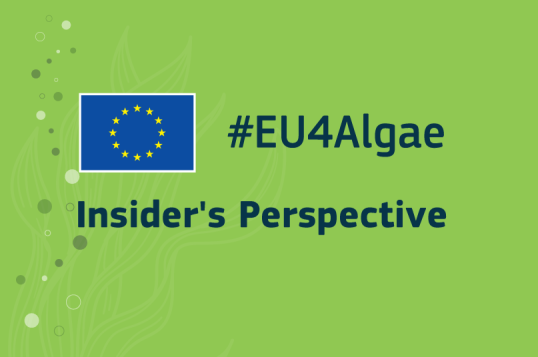
This initiative aims to ‘give the floor’ to all partners to share their projects and success stories and disseminate them with the Algae community. Keep reading to know more about the latest initiative that is part of this sixth edition!
Study to support Sustainable EU Algae Industry: Paving the way one step at a time
The European algae sector has the potential to become a significant part of the EU blue bioeconomy and contribute to the achievement of the European Green Deal objectives. Although currently small, a combination of research, innovation and enthusiastic entrepreneurship has created momentum for the EU algae sector to further develop and expand. The European Commission continues its strong support for the research and advancement of knowledge required to unlock the full potential of this emerging industry, and to that end has funded the Study to support Sustainable EU Algae Industry.
Currently in its early stages, this Study started in December 2023, and is being implemented by a consortium of partners with a strong track record and expertise in the topics required for the achievement of goals: Trinomics (project lead), s.Pro, University of Ghent, Latvian Aquatic Ecology Institute, Technopolis, Møreforsking, Roheline Vihmavari and Nord University.
Its aim is to fill key knowledge gaps and identify future needs which are integral to enabling a sustainable EU algae sector – especially for areas where information is lacking or fragmented. These areas and their specific objectives are:
-
Use of algae-based feed as a replacement of fish-based feed in EU aquaculture – Based on a comprehensive investigation into the use of algae feed in the EU and exploring different approaches and methodologies for substituting fish-based feed with algae-based feed ingredients in aquaculture. As such, perform a forecast analysis to determine the potential for replacement of fish-based feed with algae-based feed in the EU. The goal is to provide recommendations that promote low-carbon, low-trophic alternatives like algae-based feed, that could contribute to reducing the ecological footprint of aquaculture operations, aligning with broader sustainability goals.
-
Nutrients for microalgae/cyanobacteria production – Assess the state of play of alternative sources of carbon and nutrients in the cultivation of organic microalgae for fertiliser markets and analyse relevant legislative framework. The goal is to determine which alternative sources of carbon and nutrients for the production of microalgae are viable for use in fertiliser products, considering economic, legal, and environmental dimensions.
-
Use of algae for wastewater and water treatment and use of resulting algae biomass in fertilisation – Examine the potential of using algae cultivation as a technique for promoting simultaneous wastewater/water treatment and nutrient recycling for obtaining valuable products, with a specific focus on bio-based fertilisers and bio-stimulants. This work will be focused on residual wastewaters, to estimate the treatment capacity of the selected algae and the potential volume and quality of the expected products, coupled with simplified economic and environmental impact assessments. Recommendations will be produced to improve the acceptance of algae-derived bio-based fertilisers and bio-stimulants and to clarify the needed criteria for such products to be legally accepted when produced during wastewater treatment.
-
Role of algae in climate change mitigation in the European seas – Enable a deeper understanding of the potential role of seaweed in carbon sequestration and the opportunities of potential blue carbon initiatives. As such, assess the extent of seaweed forests within EU waters, and potential restoration areas. In addition, identify blue carbon good practices (macroalgae coastal/offshore production and microalgae for upcycling industrial CO2), methodologies and tools to measure carbon sequestration. The goal is to provide an assessment of the pros and cons of macroalgae production to sink sequester carbon and outline specific future needs to progress the blue carbon algae sector in the EU.
-
Wild harvesting and seaweed beach cast on European coasts – Wild harvesting and beached seaweed collection secures most of the European macroalgal biomass. Through research and data collection across the EU countries, provide reliable data and knowledge on the amounts of wild harvested and beached seaweed (compatible with EMODnet database), as well as practices on harvesting/collection, monitoring, and management. Analyse these practices to develop recommendations for regenerative harvesting approaches and environmentally friendly, sustainable beached seaweed collection.
-
Role of algae in sustainable food and feed systems – This Study will close important knowledge gaps on the role that algae (can) play in sustainable food and feed systems, including data on algae consumption across the EU countries and ecosystem services that algae can provide (e.g., GHG reduction potential, reduced pressure on land use, potential to reduce nutrients and contaminants in the water, etc.). As such, prepare business cases for the introduction of 3 algae species in animal feed, to provide substantiation for the increased use of algae for human food and feed.
Underpinning this 18-month Study is an extensive stakeholder consultation plan, to ensure comprehensive data and information collection, including validation of all findings. The project team will be reaching out to experts in the various fields encompassed by it, relevant business enterprises, as well as authorities, including many that are engaged in the EU4Algae Platform. Hence, the goal is to deliver concrete and actionable recommendations that will help advance the EU algae industry’s contribution to the objectives of the European Green Deal.
For more information on the Study to support Sustainable EU Algae Industry, contact Petra Remeta at petra [dot] remeta trinomics [dot] eu (petra[dot]remeta[at]trinomics[dot]eu).
trinomics [dot] eu (petra[dot]remeta[at]trinomics[dot]eu).
Details
- Publication date
- 24 May 2024
- Author
- Directorate-General for Maritime Affairs and Fisheries

